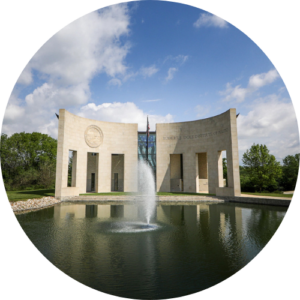Dole Institute discussions will address sustainability issues in Kansas
February 16, 2024 - News
LAWRENCE – The Robert J. Dole Institute of Politics at the University of Kansas, in partnership with the Kansas Rural Center (KRC), has announced the four-part series of discussion groups to be moderated by Dole Institute Fellow Karen Willey this spring.
Willey, a KRC board member and Douglas County commissioner, has created the series alongside discussion group coordinators Braiden Bangalan and Rachel Creighton by engaging with members of the Dole Institute’s Student Advisory Board to determine which topics related to sustainability in Kansas that students wanted to address.
The discussion group series, titled Obstacles & Opportunities: Tackling Sustainability in Kansas, begins at 4 p.m. Feb. 20 with “Farm Bill: Food and Hunger in the Heartland.” Willey will be joined by Zach Helder, senior agriculture adviser to U.S. Rep. Sharice Davids, and Nick Levendofsky, executive director of Kansas Farmers Union, to discuss prevailing issues, debates and environmental effects of the farm bill. This program is presented in partnership with the Kansas Farmers Union and the KU Department of Political Science.
The next session in the series, “Sink or Swim: The Future of Water in Kansas,” will take place at 4 p.m. Feb. 27. Kansas State Reps. Lindsay Vaughn and Kenny Titus will join Willey to explore the state of water quantity and quality and conversations happening within the state. This program is presented in partnership with the University Honors Program.
At 4 p.m. March 19, the topic is “Powering the Next Generation: Renewable Energy Options and Hurdles in Kansas.” Joining Willey will be Allison Thomas, Climate + Energy project program director; Gary Rexroad, Douglas County Planning Commission chair; Jay Kalbas, state geologist of Kansas; and Brandon Sack, clean energy development director at Evergy, to discuss the future of renewable energy development in Kansas by means of public policy, community action and environmental necessity.
The final installment of the series at 4 p.m. March 26 is “Where Do We Go Now? The Politics and Policies of Climate Adaptation in Kansas.” Kansas faces the question of how to create a livable state in the face of climate change. How can rural and urban areas adapt to become more resilient? As the environmental and ecological effects of a changing climate rapidly progress, local communities and nations alike are finding new solutions to this crisis. Guests will be announced in the coming weeks. This program is presented in partnership with the KU School of Public Affairs & Administration and the Department of Environmental Studies.
Detailed information on the programs can be found at the Dole Institute website, where programs will also be livestreamed. Viewers can also watch programming on the Dole Institute YouTube channel.
Coordinators and students Bangalan and Creighton have been working with Willey since last fall to develop the themes and secure speakers for the series.
“These programs will hold a variety of perspectives on different policy and environmental issues facing the future of our state and beyond. I believe the KU student body and the Lawrence community will find our programs engaging, informative and highly needed,” Bangalan said.
“This semester’s discussion group series taps into a topic I know many students are passionate about. I am excited for students to have the opportunity to engage and network with our exciting lineup of guests,” Creighton said.

About the Dole Institute
The Robert J. Dole Institute of Politics, a vibrant forum for civil discourse, civic engagement, and idea exchange across the political spectrum, features historical archives, exhibits, and public programs for all ages. Inspired by the public service of native Kansan, veteran, legislator, and statesman Senator Bob Dole and his wife Senator Elizabeth Dole, visitor galleries feature changing exhibits, the Kansas Veterans Virtual Memory Wall, architectural-scale stained glass American flag, and September 11 memorial.
For More Information:
Maria Fisher, Dole Institute of Politics
maria-fisher@ku.edu
(785) 864-4900
The Dole Institute is committed to universal accessibility in all programs and resources. We are in the process of making all of our web projects fully accessible. An accessible version of the material represented on this site will be made available upon request. Please contact us at doleinstitute@ku.edu to request the material be made available in an accessible format, or for general assistance.